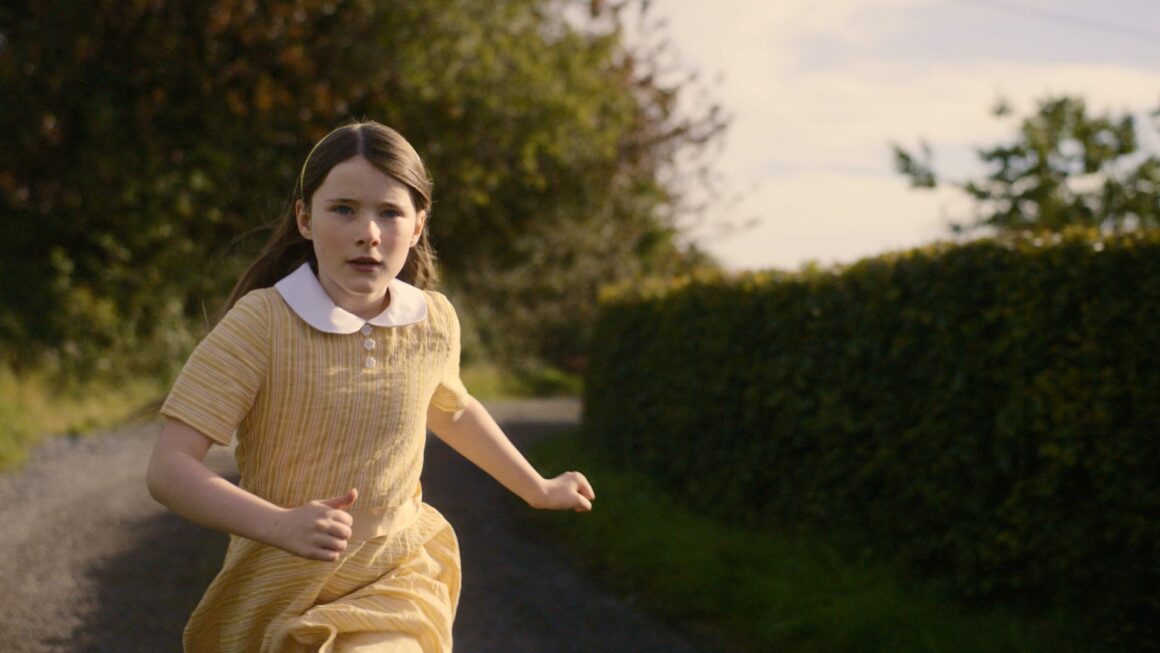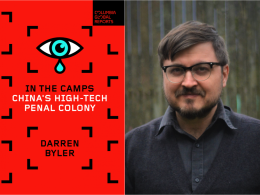An Cailín Ciúin
Directed by Colm Bairéad
Inscéal / Fís Éireann TG4, 2021
Reviewed by Eóin Dawson
When An Cailín Ciúin [The Quiet Girl] went up against Oscar winner, Belfast, at the Irish Film and Television Academy awards, many assumed the €1.2m budget Irish language film would walk away with little more than its nominations. Few would have guessed it would take seven prizes. The film adaptation of Claire Keegan’s novella, Foster, follows ten year old Cáit (played by newcomer Catherine Clinch) who is left with relatives by her neglectful parents while her mother has a baby.
The story opens on scenes of rural poverty. Viewers soon meet Cáit, wandering and struggling compared to her classmates. Subtle use of lighting hides Cáit’s parents in darkness. Her coarse father is revealed to be a drinker, a gambler and too proud to accept even the simplest acts of charity despite his farm failing and family living in poverty. Less is revealed of her mother, but her emotional distance and indifference is clear to Cáit and viewers alike.
Cáit is sent to live with her mother’s cousin and her husband. An older couple, Seán and Eibhlín. After a long drive she is greeted by warm smiles and welcoming words; “bí ar do shuaimhneas” [be at ease]. Unlike her parents, Seán and Eibhlín stand in full view, in warmly lit scenes. This is in stark contrast to her father, who suggests she work for her keep before leaving her with nothing more than the clothes on her back.
Over the course of the film, the relationship between Cáit and her foster parents only grows closer. Cáit quickly warms to Eibhlín whose kindness shows her something she never knew she needed. Eibhlín reassures her that she’ll “get used to it”. While it takes a little longer for Cáit to get to know Seán, a biscuit on a bench says all she needs to hear. And while her new home is not perfect, nor her foster parents without a past, the bond between neglected child and loving foster parents stays strong. Most importantly we see Cáit beginning to recover from her trauma.
Despite the narrow focus of An Cailín Ciúin, the film is laden with meaning. The emotional neglect and abuse suffered by Cáit at the hands of her parents, echoes the abuses depicted in The Magdalene Sisters (2002) and Song for a Raggy Boy (2003). The same abuse suffered by thousands of Irish women and children. Ireland’s history of failure to protect and care for its children casts a long shadow in An Cailín Ciúin.
Perhaps more subtle, class also plays an important role in An Cailín Ciúin. Cáit’s parents struggle financially and with her father’s alcohol and gambling addiction. Meanwhile her foster family live in comfort, able to provide a more stable foundation for Cáit. The standard of life in rural Ireland might also come as a surprise to some viewers. Despite being set in the early 1980s, like many of their era, even Cáit’s relatively comfortable foster parents rely on a well for their water. At its core, however, An Cailín Ciúin speaks of that most fundamental human need; to feel loved. While money can’t buy love, viewers will recognise what a difference it can make in making life and love easier.
An Cailín Ciúin comes just three years after the highly acclaimed famine period drama, Arracht [Monster], and many are proclaiming a new era for Irish language film. Attitudes towards the language in Ireland have shifted and there is growing interest in Irish language media, particularly amongst younger people. In comparison to many of their English language counterparts, Irish medium filmmakers appear more free in their art, receiving financing from state funds. Perhaps films like these provide a glimpse of what’s possible with an arts sector free from the narrow demands of the capitalist market. Regardless of how his follow up is funded, many will watch with keen interest for Bairéad’s next outing.
An Cailín Ciúin is beautifully shot and paced and Catherine Clinch’s break out performance as Cáit jerks more than a few tears. She’s supported by a small cast of equally talented actors who fill every scene with their presence, while still permitting Clinch to shine. The script is a mixture of both Irish and English, one of the many refreshing and novel aspects of this wonderful film. To paraphrase the stoic Seán when he commented on An Cailín Ciúin herself, “may there be many like it.”












